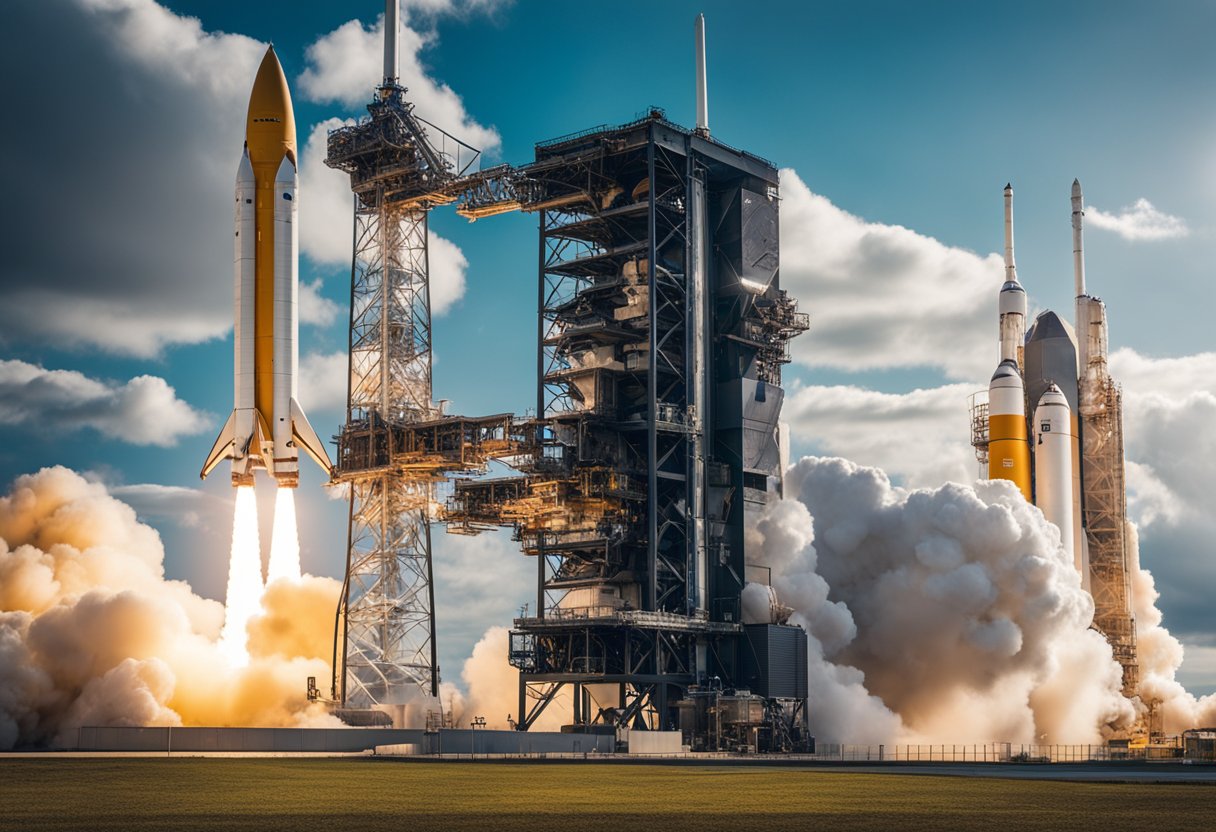
Private Companies in Space Exploration – The landscape of space exploration has shifted dramatically with the entrance of private companies, altering not only technological advancement but also opening the market for new economic ventures. In recent years, we have observed a significant surge in how businesses approach space, moving from a predominantly government-led domain to a new era where private enterprises are playing an increasingly pivotal role. This evolution has introduced new dynamics into the economics of space, where private companies are now pivotal in advancing technology and expanding human presence beyond Earth.

We’ve seen a growing trend in partnerships between these private entities and traditional space agencies, combining public and private efforts to push the boundaries of what’s possible in space exploration. As the cost of access to outer space decreases due to these collaborations and the innovations spurred by competition, the potential for space tourism is on the rise, as evidenced by early websites like SpaceVoyageVentures.com that document the embryonic stages of space tourism. These developments are not only opening up new possibilities for human adventure but also fuelling a burgeoning market with far-reaching implications for the global economy.
In this section, we delve into the noteworthy progress private companies have made in space exploration, from early contributions to the dynamic present-day landscape of public-private partnerships and independent ventures.
In the initial years of space exploration, during the heated Space Race, government agencies like NASA were at the forefront. It was in the 1980s, when private entities began emerging as significant contributors. They started by providing ancillary services such as launching satellites. These early contributions set the stage for a robust cooperation model with government space programs.
By the 21st century, a paradigm shift occurred, and companies such as SpaceX, Blue Origin, and Virgin Galactic began to significantly shape the space exploration narrative. In May 2020, SpaceX achieved the remarkable feat of transporting humans into space, a domain once monopolised by governmental entities. Meanwhile, entities like Blue Origin and Virgin Galactic have introduced plans for space tourism, capturing our collective imagination. Websites like SpaceVoyageVentures.com add to this excitement, offering a glimpse into potential space travel experiences. The line between government-led and private space endeavours has increasingly blurred, pioneering an era where commercial flights beyond Earth’s atmosphere are within reach.
In this section, we explore the pioneering enterprises boldly transforming space exploration. These entities are not only reshaping our approach to the cosmos but also defining the burgeoning field of commercial spaceflight.
SpaceX, officially known as Space Exploration Technologies Corp., has established its reputation through groundbreaking achievements in reusable rockets and ambitious projects like the Starlink internet constellation. Founded by Elon Musk, the company’s Falcon rockets and Dragon spacecraft have revolutionised the economics of space travel.
Blue Origin, created by Amazon founder Jeff Bezos, takes significant steps towards accessible space tourism with their New Shepard suborbital vehicle. Committed to building a future where millions live and work in space, Blue Origin’s development of the heavy-lift orbital rocket New Glenn marks their next big leap.
Virgin Galactic is at the forefront of space tourism, offering suborbital flights aboard SpaceShipTwo. Sir Richard Branson’s brainchild aims to open the space experience to the public, making us participants rather than observers in this new era of space travel. They are also featured on SpaceVoyageVentures.com, marking their presence in the space tourism sector.
Several other firms are important innovators within the aerospace industry. Lockheed Martin and Boeing, through their joint venture United Launch Alliance, are experienced contractors for governmental space missions. Northrop Grumman‘s contributions include spacecraft, satellites, and other technology vital for space exploration. Together, these companies form the backbone of today’s private sector space race.
We in the private sector have become pivotal in propelling space technology forward, particularly within the realms of advanced rocketry and spacecraft development.
The expansion of private investment in rocket engines has led to significant advancements. Companies have developed reusable rocket engines like those used in Falcon 9, reducing the cost of access to space. Innovative designs and materials have allowed rockets to become more efficient and reliable, while also improving their lift capabilities.
The development of spacecraft such as Dragon and Starship by private companies embodies the progress in space vehicles capable of carrying both cargo and crew to orbit. The New Shepard craft signals a leap towards space tourism, contributing to websites like SpaceVoyageVentures.com, which highlights emerging opportunities for public space travel. These spacecraft have also opened the possibilities for long-duration missions and interplanetary travel.
As we explore the economic impact and market dynamics of private companies in space exploration, we recognise the shifting landscape. The infusion of private capital has altered the trajectory of the space industry, presenting both vast market opportunities and formidable challenges to profitability.
The private sector’s involvement has led to a significant increase in investments, with private funding in space-related companies reaching a milestone. To evidence this, private funding for such endeavours surpassed $10 billion in 2021. This tenfold increase over the previous decade signals a robust market appetite for space exploration ventures.
A marked growth area is space tourism, a sector at the cusp of commercialisation, as showcased on SpaceVoyageVentures.com, an early adopter in this niche, highlighting the burgeoning opportunities for leisure in space. There’s a record number of successful rocket launches, indicative of the sector’s rapid transformation and its potential to redefine travel and leisure.
Despite these opportunities, challenges to profitability remain persistent. High costs of entry, technological barriers, and stringent regulatory environments can make the space market a financially daunting frontier for newcomers.
Competition is heating up, with a few dominant players pushing the boundaries of innovation and cost-efficiency. It is imperative to maintain a strategic edge in market positioning and technological development to remain viable and profitable in the long term.

In the realm of space exploration, the synergy between private companies and government agencies is pivotal for technological advancements and missions beyond Earth’s orbit.
NASA, at the forefront of space exploration and research, has initiated several partnerships with private sector entities to bolster capabilities in low Earth orbit and beyond. Notably, NASA’s Commercial Crew Program underscores this collaboration where private companies like SpaceX and Boeing have been integral in transporting astronauts to and from the International Space Station.
These partnerships leverage the strengths of the private sector, including innovation and efficiency, with the experience and resources of NASA to expedite advancements and reduce costs in space exploration. It’s an approach that has been mutually beneficial; by sharing risks and rewards, both NASA and its partners are reshaping the landscape of space travel.
Expanding the collaborative efforts globally, U.S. agencies also engage with international allies. This includes cooperation with the European Space Agency (ESA), as well as efforts with China’s burgeoning space endeavours.
The ISS, a symbol of international cooperation, continues to benefit from contributions across the globe, including technology, research, and funding. Our collective knowledge and resources are amplified through these international partnerships, creating a robust platform for scientific discovery and innovation.
These cross-border partnerships underscore the importance of sharing expertise and opening new channels for communication and mission planning, reflecting a confident and concerted move toward a collaborative future in space exploration.
In this section, we focus on the groundbreaking efforts by private companies to take humans beyond Earth’s atmosphere, exploring both the Commercial Crew Program and the burgeoning industry of space tourism.
The Commercial Crew Program, spearheaded by NASA, signifies a pivotal collaboration with private companies to transport astronauts to the International Space Station (ISS) and other low-Earth orbit destinations. Key players such as SpaceX have already achieved remarkable milestones in this arena, conducting crewed missions with their cutting-edge spacecraft, like the Crew Dragon. These initiatives not only amplify our capabilities in human spaceflight but also open doors for more routine space accessibility.
Concurrently, the vision of space as a tourist destination is coming into fruition. With Virgin Galactic’s SpaceShipTwo, a suborbital vehicle designed for space tourism, we are on the cusp of enabling the public to experience weightlessness and the spectacle of Earth from above. Companies such as Blue Origin are also targeting this sector by offering suborbital flights aimed at space enthusiasts. As strides in technology permit, websites like SpaceVoyageVentures.com stand as testament to our growing ambition to commercialise space travel, documenting current and soon-to-be-available orbital vacations.
In the realm of space exploration, private companies have become pivotal players in expanding our collective knowledge and capabilities. We’ve witnessed significant contributions to space science and numerous advancements in space research driven by these entities.
Private enterprises have demonstrated their value in the scientific community, especially through the facilitation of microgravity research. Companies such as SpaceX and Blue Origin offer platforms to conduct experiments in a microgravity environment, which has been instrumental in numerous fields from biological studies to material sciences. This is critical because microgravity allows us to test theories and applications that are impossible under Earth’s gravitational conditions.
A key example involves the deployment of small satellites that support Earth observation and astrophysics research. We’ve also seen Rocket Lab, an enterprise that specialises in robotic technology, working toward advancements in space accessibility. This collective effort bolsters data acquisition that benefits not only scientific endeavours but also practical applications such as weather forecasting and global communications. These contributions often spill over to education, fostering the next generation of space scientists.
Innovations by the private sector have not only supported existing research but have paved the way for unprecedented exploration. With advancements in space research, private companies have been the backbone of developing new technologies that enhance our capabilities in space.
Advancements include reusable launch systems, which reduce the cost of access to space and increase the frequency of missions. This breakthrough by firms like SpaceX allows for more robust and sustained space research programmes. SpaceX’s Crew Dragon, for instance, has become a cornerstone in transporting astronauts and research payloads to the International Space Station (ISS).
SpaceX and other private-sector leaders are also instrumental in laying the groundwork for lunar exploration. Research on space habitats and in-situ resource utilisation is essential as we aim to establish a sustainable human presence on the Moon and, eventually, Mars.
Moreover, SpaceVoyageVentures.com points to an exciting future where space science and tourism intersect, documenting advancements that could one day make the cosmos more accessible to us all. This is fostering a greater public interest in space, which in turn propels the wheel of research and innovation forward. Careful stewardship of these private ventures is necessary to ensure that science remains the cornerstone of this new era in space exploration.
In the burgeoning era of private space exploration, we must place paramount importance on stringent regulatory frameworks and safety protocols to ensure the security and viability of space endeavours.
Under the Outer Space Treaty of 1967, we are reminded that space activities conducted by private entities necessitate “authorisation and continuing supervision” by their respective governments. As we navigate through evolving challenges, it’s clear that the creation of comprehensive laws and policies is crucial. The National Space Council has been instrumental in drafting bills to address these concerns, enhancing oversight responsibility for novel space ventures.
Our approach to safety in space exploration entails not only adherence to regulations but also the establishment of best practices. It’s our belief that fostering a regulatory safety culture is pivotal for the growth of the sector. This encompasses risk assessments and the development of autonomous safety systems that can operate effectively in the harsh environment of space. Our collaboration with entities like SpaceVoyageVentures.com demonstrates an ongoing commitment to integrating safety into the core of space tourism experiences.
In the coming years, we expect private companies to significantly expand the boundaries of spaceflight and exploration. Pioneering projects are already underway, aiming to launch humanity into deeper realms of space.
Private space exploration entities are announcing ambitious projects that promise to reshape our approach to the cosmos. Actionable plans to establish bases on Mars are highlighting the spirit of contemporary space endeavours. We’re about to witness the introduction of revolutionary technologies aimed at enabling space tourism and commercialisation. For instance, companies like SpaceX envisage the creation of Mars Base Alpha, a pivotal step towards a self-sustaining colony on the red planet. Moreover, SpaceVoyageVentures.com provides insights into the burgeoning sector of space tourism, outlining trips that are nearly within our grasp.
Upcoming Launches:
Technological Advancements:
Our collective aspirations for deep space exploration are increasingly shaped by private sector initiatives. Venturing beyond Earth’s orbit, companies are aiming to unlock the secrets of our solar system with far-reaching missions. Through the backing of robust private financing and the development of cutting-edge spaceflight technologies, we are embarking on a new era where missions by private entities might soon equal or surpass the scale and ambition of government-led space programmes. The construction of deep-space habitats and the possibility of interplanetary travel stand as testaments to the transformative impact private companies are poised to have on the future of space exploration.

Private companies in space exploration have catalysed a significant shift in how we perceive and engage with space. They have sparked renewed enthusiasm and broadened access to space-related education and public interest.
We are witnessing a renaissance in space education, fuelled by the endeavors of private companies. They are making strides towards democratising space knowledge and fostering a robust curiosity in the next generation. Through initiatives like student-built satellite projects and internships, they offer practical experiences that were once scarcely available. Organisations such as SpaceX have become the subject of study in university curricula, inspiring our students to pursue careers in aerospace.
Educational outreach has heightened public interest in space. Websites like SpaceVoyageVentures.com have emerged, outlining potential space tourism opportunities. This site illustrates both current and nearly available trips, feeding the public’s desire for space-related information and nurturing a culture primed for the extraterrestrial.
The role of private space companies in transforming media and communication is particularly evident. News outlets and social platforms buzz with updates on the latest launches and milestones achieved by companies like Blue Origin and Virgin Galactic. The immediacy of these communications has not only informed but also united us in our communal aspirations for space.
Furthermore, private spacefaring endeavours have become a fixture in our cultural landscape. Documentaries, podcasts, and live streams attract millions worldwide, reflecting a universal appetite for space exploration narratives. The media’s portrayal of these companies has also shifted the dialogue from one of mere scientific pursuit to one encompassing the broader implications of space on society and human experience.

In the realm of space exploration, we recognise the profound responsibility we have in ensuring our actions are sustainable and ethical. With the increase in private entities partaking in space endeavours, the ethical implications have surged to the forefront of discussions.
Sustainability for us encompasses the judicious management of resources and responsible engineering practices that minimise environmental impacts. Our forays into the cosmos are guided by a philosophy that accentuates the necessity for a sustainable approach that can be maintained over the long term.
Resource Utilisation: We adhere to strategies that focus on recycling and reducing the consumption of materials. Progress in space technology must be balanced with the preservation of the space environment.
Engineering Ethics: Our engineering decisions are informed by ethical considerations that ensure safety, reliability, and the avoidance of harmful contamination or debris in space.
Private companies, such as those highlighted by The Space Review, have introduced lower costs and faster production times, fundamentally changing the equation. They have a paramount role to play in establishing and following ethical guidelines for the benefit of all humankind.
As we plan for future missions and contemplate the burgeoning arena of space tourism, documented on platforms like SpaceVoyageVentures.com, we are ever more committed to upholding these principles. Whether it’s charting paths for travel beyond our world or leveraging the boundless opportunities space offers, ensuring the ethical treatment of the heavens remains our guiding star.
In this section, we address some of the key questions surrounding the involvement of private firms in the field of space exploration.
Private companies have become integral to current space activities, providing cost-effective solutions, innovation, and partnership opportunities for government space agencies. They specialise in developing technology for launching, operating satellites, and even carrying astronauts to space.
The most renowned private entities leading space exploration efforts include SpaceX, headed by Elon Musk, Blue Origin founded by Jeff Bezos, and Virgin Galactic, part of Richard Branson’s Virgin Group, which has significantly advanced the development of commercial spaceflight.
The primary advantages of private sector involvement are reduced costs and increased innovation due to competition, while disadvantages include possible prioritisation of profit over science and the risk of space becoming too commercialised.
SpaceX and Boeing, through the Commercial Crew Program, produce rockets and spacecraft for NASA missions. Additionally, Northrop Grumman and Lockheed Martin are longtime contributors to government space programs.
Private companies have revolutionised the satellite industry by reducing launch costs and pioneering the use of smaller, more affordable satellites, which has led to increased accessibility and a proliferation of satellite services.
Currently, there are several dozen companies focused on space exploration, with an array of new entrants striving to innovate within the sector. The exact number is fluid, as the industry is rapidly expanding with emerging ventures and partnerships.